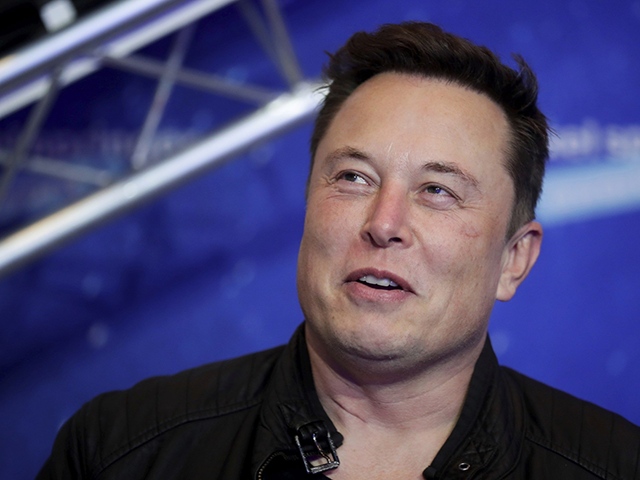Tesla CEO Elon Musk on Sunday praised China for “leading the world in renewable energy generation and electric vehicles.”
Musk made a point of repeating his comment on both Twitter and Weibo, the heavily-censored social media network Chinese subjects are forced to use because Twitter is only available to high-ranking Communist officials.
On Twitter, Musk was responding to an observation that China allegedly has far higher wind power capacity in megawatts than the United States and European countries — 328,973 megawatts for China versus 132,738 for runner-up America.
China is the world’s worst polluter by a considerable margin, and it does not rely on wind or solar power for the bulk of its electricity — no large country can power fleets of electric cars with windmills. China burns titanic amounts of coal to obtain most of its power, more than from all other sources combined, and its use of coal is steadily increasing.
Musk’s Tesla has extensive business interests in China, which he evidently feels obliged to protect by flattering the regime in Beijing, even though it is the antithesis of everything he claims to believe about free speech and free enterprise. Musk clearly knows this, since he has a Weibo account. More disturbingly, Tesla has actively encouraged China’s vast censorship machine to silence criticisms of its products on social media.
Musk does not just praise China for using electric cars and windmills — he has praised the Chinese government as more concerned with the welfare of its people than Western nations and described Chinese workers as more intelligent and “hard-working” than Americans.
Tesla opened a high-profile showroom in China’s Xinjiang region, home of the oppressed Uyghur Muslims, in January despite an international outcry about forced labor and other human rights violations. China eagerly used Tesla’s operation in Xinjiang for propaganda to whitewash the Uyghur genocide.
The Chinese Communist regime is beginning to reciprocate Musk’s rhetorical support, for example by denouncing all criticism of Tesla and its CEO as “political depravity” in January. In April, Chinese state media cranked out a string of editorials taking Musk’s side in a spat with fellow billionaire Jeff Bezos of Amazon.
Musk may well be thinking of how China uses “sharp power” to compel foreign businesses to toe the Communist political line by threatening their sales and investments in China. The Chinese government expects constant praise from its business partners and has a very thin skin for criticism, as it is currently demonstrating by using diplomatic leverage to censor an Israeli newspaper for publishing an interview Beijing did not like.
The South China Morning Post (SCMP) on Monday went further and suggested Musk’s Tweet and Weibo post were meant as “a warning to U.S. policymakers that they must tread carefully to ensure China continues to cooperate on tackling the long-term global issue of climate change.”
“If parts of the clean energy supply chain, like battery and smart grid equipment, come under bifurcation pressures like those seen in 5G, equipment costs will increase and the pace of decarbonization in many developing countries may slow down further,” Hong Kong-based analyst Lucas Zhang Liutong told the SCMP.
This was a reference to the United States and allied nations banning 5G wireless networking hardware from Chinese corporations with links to Beijing’s military and intelligence apparatus. Canada joined the list of nations banning 5G hardware from Chinese telecom giant Huawei in May.
The inference is that China controls much of the supply of components and raw materials needed for electric vehicles, wind farms, and solar power, so if the Chinese government feels angry or isolated, it could cripple companies like Tesla and choke out entire green industries. Some might take this stark reality as a warning not to become dependent on technologies that can be so easily manipulated by the world’s great authoritarian menace, but a billionaire who makes a fortune selling electric cars might see the situation differently.
Green energy proponents receive special exemptions from Western media for acting in their obvious self-interest — they are never accused of greed, excessive ambition, or profiteering from government subsidies. Even if Elon Musk is given the benefit of complete sincerity for his electric car enthusiasm, the people of the free world would be justified in feeling nervous about a “green revolution” that seems like it can only be implemented effectively through authoritarian force.

COMMENTS
Please let us know if you're having issues with commenting.